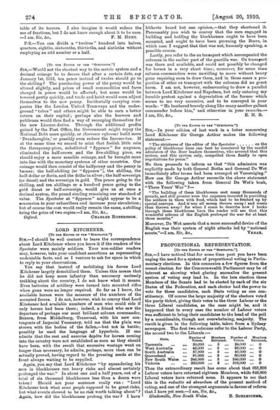[To VIZ EDITOR OF THE "SPECTATOR."' Sza,—Would not the shortest
way to the metric system and a decimal coinage be to decree that after a certain date, say January 1st, 1912, ten pence instead of twelve should go to the shilling P The purchasing power of the penny would be altered slightly, and prices of small commodities and fares charged in pence would be affected ; but some would be lowered pretty quickly, and trade and habit would soon adjust themselves to the new penny. Incidentally carrying com- panies like the London United Tramways and the under- ground " tubes " and others might be able to earn a better return on their capital ; perhaps also the brewers and publicans would thus find a way of recouping themselves for the new License-duties. Through the additional profits gained by the Post Office, the Government might repay the National Debt more quickly, or (horresco referens) build more ' Dreadnoughts,' or possibly even reduce the Income-tax. If at the same time we ceased to mint that foolish little coin the threepenny-piece, substituted " fippence " for sixpence, eliminated the half-crown and the five-shilling piece, we should enjoy a more sensible coinage, and be brought more into line with the monetary systems of other countries. Our coinage would then consist of the halfpenny and the penny in bronze; the half-shilling (or " fippence "), the shilling, the half-dollar or florin, and the dollar in silver ; the half-sovereign (or ducat) and the sovereign in gold. Ten pence going to the shilling, and ten shillings or a hundred pence going to the gold ducat or half-sovereign, would give us at once a decimal system, the pound sterling remaining our standard of value. The Spectator at " fippence" might appear to be a soncession to your subscribers and increase your circulation; but of course the cost would really remain the same, a shilling being the price of two copies.—I am, Sir, &c.,






































 Previous page
Previous page